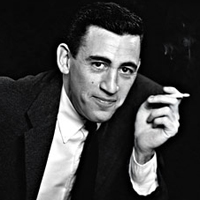Themes in Salinger's The Catcher in the Rye
The Catcher in the Rye by JD Salinger is one and only novel by the great author in which he embedded many themes that would help us to understand the characters and their worlds.

Jerome David Salinger
Innocence is one of the major themes of the novel The Catcher in the Rye. The innocence of children and their world of understanding is the major concern for the protagonist Holden. He wants to protect the virtue of goodness of kids. He is basically influenced by a song 'if a body catch a body coming through the rye'. He idealizes himself catching the children who would come to play in the rye field from falling from the cliff. Here catching the children means saving their innocence for Holden. Holden hates the adult world where all are corrupted and the virtues are lost. The people he loves and cares most represent innocence. He always takes Jane as the girl whom he used to play games during childhood. He never sees in her a maturing woman and a growing girl. They often hold hands, but Holden says that he never had sex with her. However, he suspects she might be the subject of sex by stepfather or by Ward. What is important for him is her purity and innocence which he wants to save.
Death is another significant theme in the novel. It is constantly presented in Holden's younger brother Allie’s spirit. He has been dead for three years. When Holden thinks that he will die soon or disappear soon, he speaks to the dead Allie. The thought of Allie haunts him in the rainy cemetery. For him death is just the fluctuation of time. The destroyer time has taken his loving brother. He has a strong desire that everything, especially the beauties of the world like innocence, love, virtue, sincerity, faith etc. remain same and death may not have any effect on them. He aspires to be the catcher in the rye to hold the children from falling off the cliff of old age, death and the phonies of the world. He rejects the life and its natural change that occurs. He loves the Museum of Natural History since "everything stayed right where it was. Nobody'd move." He does not want to grow up, but his biological change and growth do not follow his whimsical desire. He fears the old age and death. His fear and lack of capability to cope with the growing change and the society leads him to extreme frustration and madness.
Another strikingly important theme is Holden’s hatred of phonies. This word ‘phonies’ is most frequently used in this novel by Holden. For him the fake people and the fake society all are phonies. He wants sincere and true behaviors from the people, but when he gets the opposite he hates them. He describes his principal as a "phony slob." Even the advertisements for Pencey Prep are deceptive. They feature "some hot shot guy on a horse" performing horse-riding feats. Holden mockingly says he has never seen a horse at Pencey. The school's slogan is equally disgusting to Holden: "Since 1888 we have been molding boys into splendid, clear-thinking young men." Holden thinks perhaps there are two boys who fit that description, and they probably might have come to Pencey that way. For Holden, the school is representative of a corrupt system planned by adults and catering for boys who want to join their ranks. When he is in New York, Holden goes out with Sally Hayes on a date. Her phony-sounding conversation with an acquaintance vexes him and contributes to the dreadful end of the date. Holden's hatred of phonies and reluctance to endure them sets him apart. This tendency may either lead Holden to greatness or destroy the young man.
Holden always doubts the authority figures. This is another vital theme of The Catcher in the Rye. He is so rebellious to the authority that he rarely believes what they say and suggest. He is sure that the administrators and the people in the power never tell the truth so he remains hesitant to accept their statements. For example, when a religious speech is given to the school by a wealthy undertaker, he reacts scornfully. Instead of feeling respectful, Holden feels like laughing when the man talked about praying to Jesus while driving his car. When his teacher, Mr. Spencer, advises him about thinking about the future and move according to the change, Holden recognizes the old man's good intentions, but does not simply comply, because he knows the two of them are "too much on opposite sides of the pole." The best proof of Holden's disbelief toward authority figures is shown at the end of the novel when he stays with his former English teacher. His teacher gives Holden intelligent advice about getting his life back on track. But when Holden wakes up, he feels the creepy sensation by the stroke of Mr. Antolini. He takes this massage as a sign of homosexual and thinks not to trust people simply because they occupy respected positions.
